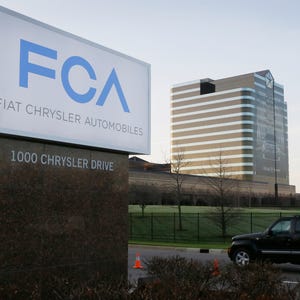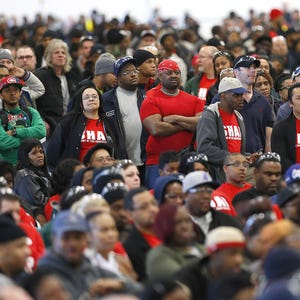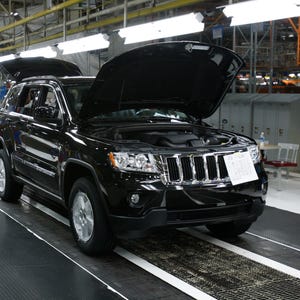DETROIT — Frustration with a type of work schedule that some describe as inhuman — when employees work four, 10-hour shifts per week and switch from late-night shifts to predawn starts within a few days — contributed heavily to the rejection of a UAW labor deal last week.
“Alternative work schedules,” as they are called at Fiat Chrysler Automobiles, have become increasingly common across the auto industry because they let plants keep the line running for four extra hours per day without paying significant overtime.
“It deprives people of sleep and damages their health,” said John Klik, who retired a year and a half ago from the Warren Stamping Plant. “Anyone with a young family is screwed. It’s not a life. It’s an existence.”
USA TODAY
UAW threatens strike at Fiat Chrysler
The UAW’s tentative deal with Fiat Chrysler was rejected last week with 65% of Fiat Chrysler union members voting it down. Workers cited entry-level pay, but the work schedule issue has been bubbling for some time, and workers had been looking for more relief.
“It is physiologically more stressful and sociologically more stressful.”
Bill Davis, vice president of operations at Circadian
Under the Fiat Chrysler alternative schedule, plants churn out cars or trucks 20 hours per day, instead of the usual 16, and few workers (if any) earn overtime, even if they work on a Saturday.
The labor agreement would have provided for paying time and a quarter for Saturday hours. But most workers want regular eight-hour shifts with more traditional opportunities for overtime.
“I did it for four and half months, and it’s depressing,” said Tim Manriquez, a skilled-trades worker at a Kokomo, Ind., transmission plant. “After 10 hours, by the time you get home, everything is closed. It’s hard to get anything done outside work.”
What would Manriquez propose?
“Go back to five, eight-hour days. That’s what everyone wants,” he said.
USA TODAY
UAW vows to 'to tell whole story' to members
That takes out the four extra hours of output and raises the possibility that some workers will put in overtime when sales are strong.
“I did it for four and half months, and it’s depressing.”
Tim Manriquez, a skilled-trades worker at a Kokomo, Ind., transmission plant
Much like the two-tier wage structure the UAW agreed to when the automakers were on the brink of failure in 2009, the alternative work schedules were sold as a way to keep production and jobs in the U.S. Now, both concessions are hard to undo.
Fiat Chrysler has been using alternative schedules since 2011, when sales of Ram pickups and Jeep SUVs began rising. That year’s labor contract enabled the UAW’s vice president for the Chrysler department, then General Holiefield, to approve the details of shift schedules.
General Motors uses a range of work schedules, but it currently has no plants where any one shift swings from days to nights in the same week, according to a company spokesman.
Ford uses variations of Fiat Chrysler's schedule, but gauging the level of discontent over it is difficult because Ford is not as far along in its UAW negotiations this year.
USA TODAY
UAW, Fiat officials miscalculated young worker angst
Gary Walkowicz, bargaining chairman at Local 600, which represents workers at Ford’s Dearborn Truck Plant, said schedules aren’t the first issue workers bring up when discussing what they want in a new agreement, perhaps because the 10-hour shifts have been in place longer. “But if you bring it up, they will say they don’t like it,” he said of Ford’s schedule, in which one crew works shifts between days and nights, working Monday night, then Friday and Saturday days and then Sunday night.
“It’s how it disrupts your life. It is not a humane way to work and not a healthy way to live,” Walkowicz said. “More compensation doesn’t fix it,” he said of the Fiat Chrysler agreement that provides double time for Sundays.
USA TODAY
UAW votes down Fiat Chrysler contract
A recent Harvard Medical School study that found a quarter of all U.S. workers have insomnia, costing U.S. employers $63 billion in lost productivity each year.
“Studies have indicated that those (who) work across (the) night shift do have higher incident of cardiovascular disease. It is physiologically more stressful and sociologically more stressful,” said Bill Davis, vice president of operations at Circadian, a company that advises companies that run production and deliver services on a 24/7 basis.
Some have tied this type of worker issue to lowered product quality, including increased recalls of vehicles, but there is no research that shows alternative work schedules are causing increased quality problems.
“The company would have data that sheds light on that issue,” said Peter Berg, professor of employment relations at Michigan State University's School of Human Resources and Labor Relations. While the schedules help increase production, Berg said the union might want to ask for evidence that savings from not paying overtime exceeds the cost of quality and safety recalls.
Contributing: Alisa Priddle, Detroit Free Press
Warren Stamping Plant
A Shift: 6:30 a.m. to 4:30 p.m. Monday to Thursday
B Shift: 4:30 p.m. to 2:30 a.m. Wednesday to Saturday
C Shift: 4:30 p.m. to 2:30 a.m. Monday and Tuesday; off Wednesday and Thursday, then 6:30 a.m. to 4:30 p.m. Friday and Saturday
Kokomo Transmission
A Shift: 6 a.m. to 4:30 p.m. Monday to Thursday
B Shift: 4:30 p.m. to 3 a,m. Wednesday to Saturday
C Shift: 7:30 p.m. to 6 a.m. Sunday, and Monday into Tuesday; off Wednesday and Thursday, then 6:30 a.m. to 2:30 p.m. Friday and Saturday




No comments:
Post a Comment